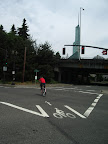A great conversation with a consultant who is working on modifying the Green Wave signal timing to incorporate transit priority measures that will reduce delay for buses. In describing the two Green Wave projects we have implemented in Portland outside of downtown (which is all timed for human scale speeds) we discussed the relative importance of certainty associated with the signal timing and the practical implementation issues associated with what you cannot at the intersectionof two green waves. Our experience in Portland is a little difference because our Green Waves are on one way couplets, which makes the progression issue less of an issue in the opposite direction.
 |
| From One Greenwave unofficially starts at the Bike Signal at Interstate & Oregon |
The person I talked to was also very interested in what we've done with VISSIM to assess bicycles and pedestrians. While we've used some of the elements of simulation, I would say we've just scratched the surface related to what can be done. Beyond the simple assessment of adequacy of the facilities, is the quality of the network to support multimodal travel. There are a lot of details we are not ready to assess to fully evaluate tradeoffs between transit, bike, ped, and freight mobility. Things like the use of detection are difficult to weigh without performance measures and a complete assessment for the 24/7 operating conditions we deal. This is not to mention the maintenance issues associated with the decision of the engineers.
Finally, we discussed detection technology, which is consistent with several posts and a recent inquiry from the Oregonian, BikePortland, and Alta about some work that was done in Pleasonton, CA.
No comments:
Post a Comment